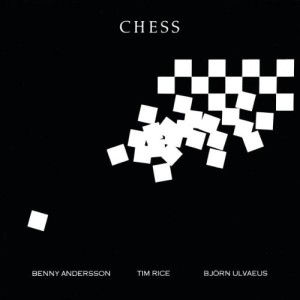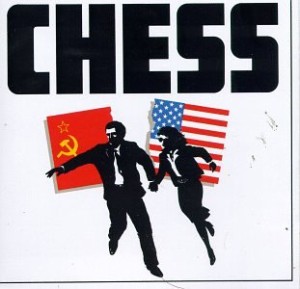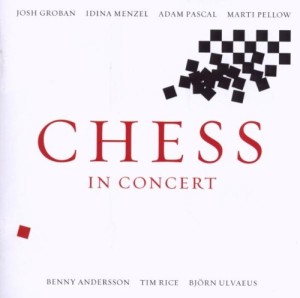Like Ragtime, Into the Woods is another show that I listened to years ago and never quite got around to seeing. “I Know Things Now,” “On the Steps of the Palace,” and “Giants in the Sky” were popular with the musical theater crowd back in college, and I performed “Agony: Reprise” in class once*, but somehow I never watched the filmed version of the stage play with Bernadette Peters (I’m kind of baffled, honestly), and it wasn’t popular among the local theaters…until this year.
I decided I wanted to see a production onstage before I saw the movie, and managed to score a discount ticket to the Oregon Shakespeare Festival’s production when the tour hit Los Angeles.
For those unfamiliar with the show: Act One weaves Little Red Riding Hood, Cinderella, Jack and the Beanstalk and Rapunzel together with the story of a childless couple seeking to lift the curse a witch placed on them years ago. Act Two picks up on the consequences of what happened in Act One: an angry giant looking for Jack, princes who are more charming than sincere, Rapunzel trying to overcome years of emotional abuse, and so on. “Happily” may exist, but “ever after” is an illusion, and everyone’s more complicated than their stories might suggest.
OSF On Stage
The cast was quite good, and I got a kick out of seeing John Vickery (whom I remember as Neroon in Babylon 5) as the Narrator and Mysterious Man. I did have trouble following some of the larger ensemble numbers, though: So many voices singing high-speed, precision Sondheim at once. There’s a reason the Sondheim section in in The Musical of Musicals (The Musical) is called “Into the Words.”
The set consisted entirely of several levels of platforms, scaffolding and ladders to suggest towers, beanstalks and the like. Costumes started out similarly minimal, just contemporary clothes that suggested the character’s personality or role, then slowly became more period over the course of the opening number. The show is strongly built around storytelling (the narrator’s abrupt disappearance in act two isn’t just a gimmick, it marks a major shift in the characters’ lives), and the costume changes fit with that.
Something I’d missed or forgotten from the songs was just how much of act two is set up in act one. Cinderella’s uncertainty, Jack’s recklessness, even the turns taken by the baker and his wife are given enough setup to be believable. (The baker seems like a nice guy in the songs. Add in the bits in between and it’s clear he’s also a bit of a “nice guy” at the beginning.) [Edit: Now that I’ve listened through the cast album a couple of times, there’s a lot more than I remember.]
I loved Little Red Riding Hood’s turn for the savage after the wolf encounter: wearing the wolfskin cape, living in a cave, carrying a knife and hunting wolves.
The Witch especially is a lot more complicated than she seemed in the songs that I remembered. I kept comparing her and Rapunzel’s relationship to the version in Tangled, which has got to have been influenced by this show. She’s less of a clear-cut villain than Mother Gothel is, though: as cruel as she is, she’s actually sincere in her love for her stolen daughter. She’s just waaay off base in how to show it.
I left the theater with a much greater appreciation of the show!
The Movie
I liked the movie a lot as well. The ensemble numbers actually worked better: a movie lets you perfect the sound balance, so everyone’s intelligible. [Edit: Also, the more complicated numbers like “Ever After” are gone.] Having actual children play Little Red and Jack also makes a big difference, and while I liked the actors’ performance on stage, I think it works better this way.
It takes itself a bit more seriously than it should, but the only place the movie really fell flat on its own terms was with the wolf. Everything else in the film is presented as a realistic take on fantasy (well, with singing). Making the wolf look human with furry ears and a mustache works on stage where everything is impressionistic, but here it just doesn’t mesh. It might have worked if they’d presented him more like a werewolf, transforming into human form for the song.
Compared to the stage version, act two loses something when it’s set right after act one instead of giving it time so that we’re seeing people adjusted (or not) to their happily ever afters. That’s a bigger loss than, say, the narrator, or Rapunzel’s aftermath. Rapunzel doesn’t really do much in the show, so much as she is — cutting her from the second act hurts the Witch’s story more than it hurts hers.
I really missed “No More,” though. It sums up everything the Baker experiences and learns in the show, and builds to his key self-realization and decision. What they did instead sort of works, but it’s not nearly as effective. Sure, they cut the Mysterious Man, but I think they could have made it work using the device of the Baker imagining his father.
I thought it was a great version of the musical, and while it does make me want to dig up the Bernadette Peters version, it’s not out of disappointment, but a rekindled interest in the show.
*Flashback
When we presented the scene in class, I** mispronounced the title as “Agony: Re-prize.” My scene partner quickly corrected it to “Re-PREEZE,” and I automatically repeated it. It wasn’t planned, but it was a perfect echo of the “Dwarves–” “Dwarfs!” “Dwarfs.” exchange in the song!
**Actually, I can’t remember which of us got it wrong and which of us corrected it. But it was probably me.




 As I
As I